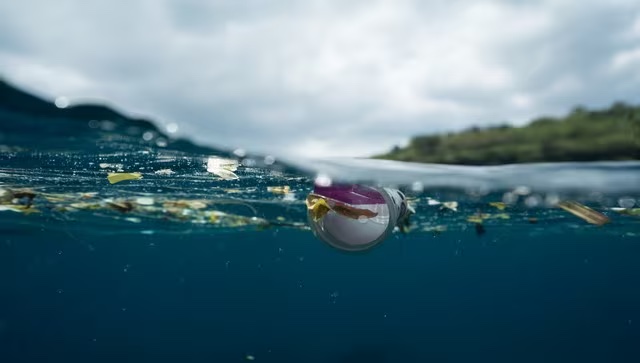
Dissecting them, the researchers distinguished the examples as another sort of geographical development, combining the materials and cycles the Earth has used to shape rocks for billions of years with another fixing: plastic garbage
Trindade Island is a volcanic outcrop that can be reached by boat in three to four days off the coast of Brazil. Few places on Earth are as remote as it is.
Therefore, when geologist Fernanda Avelar Santos discovered an alarming sign of human influence on the otherwise undisturbed landscape, she was startled: The ocean’s abundance of plastic pollution resulted in the formation of rocks.
The plastic rocks were first discovered by Santos in 2019 when she visited the island to conduct research for her doctoral thesis on landslides, erosion, and other “geological risks.”
She came across a large outcrop of the peculiar-looking blue-green rocks while she was working near a protected nature reserve known as Turtle Beach, which is the largest breeding ground in the world for the endangered green turtle.
After her two-month expedition, she brought some back to her lab out of curiosity.
She and her team identified the specimens as a novel geological formation by analyzing them and combining a novel ingredient with the materials and processes Earth has used to form rocks for billions of years: plastic garbage.
She told AFP, “We came to the conclusion that human beings are now acting as a geological agent, influencing processes that were previously completely natural, like rock formation.”
“It is consistent with the concept of the Anthropocene, about which scientists are frequently speaking these days: the geological period when humans had an impact on the natural processes of the planet. The Anthropocene will be marked by the presence of this rock-like plastic in the geological record.
Paradise island According to Santos, a professor at the Federal University of Parana in the south of Brazil, the discovery left her “disturbed” and “upset.”
She portrays Trindade as “like heaven”: a delightful tropical island whose distance has made it a shelter for a wide range of animal varieties — ocean birds, fish tracked down just there, almost wiped out crabs, the green turtle.
The main human presence on the South Atlantic island is a little Brazilian army installation and a logical exploration place.
She declared, “It’s marvelous.”
“So it was even more horrifying to find something like this on one of the beaches with the most ecological significance.”
She went back to the island at the end of last year to get more samples and learn more about the phenomenon.
Proceeding with her exploration, she found comparable stone like plastic arrangements had recently been accounted for in places including Hawaii, England, Italy and Japan starting around 2014.
She stated, however, that Trindade Island is the most remote location on Earth where they have been discovered thus far.
She worries that microplastics will be released into the environment and further contaminate the island’s food chain as the rocks erode.
“Paradigm shift” Her and her team’s study, which was published in the journal Marine Pollution Bulletin in September, divided the new type of “rocks” that are found all over the world into several categories: plastiglomerates, which are comparable to sedimentary rocks; pyroplastics” that look like clastic rocks; and a previously unknown type known as “plastistones,” which resemble igneous rocks that are formed by lava flow.
Her team wrote that “Marine pollution is causing a paradigm shift for concepts of rock and sedimentary deposit formations.”
“What is truly natural is called into question because human interventions are now so widespread.”
They discovered that fishing net remnants were the primary component of the rocks Santos discovered.
She said, however, that ocean currents have also brought a lot of bottles, household garbage, and other plastic trash from all over the world to the island.
Santos stated that the subject will be the primary focus of her research.
She stated that Trindade “is the most pristine place I’ve ever seen.”
“How widespread the problem is worldwide is demonstrated by its vulnerability to trash contaminating our oceans.”